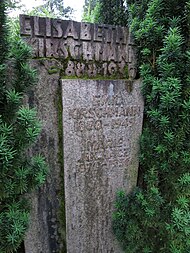Elisabeth Röhl
Elisabeth Röhl (born August 22, 1888 in Landsberg an der Warthe , † September 21, 1930 in Cologne , born Elisabeth Gohlke , later married Elisabeth Kirschmann-Röhl ) was a German politician of the SPD .
Life and work
After attending primary school, Elisabeth Röhl completed an apprenticeship as a tailor . She was active in the association of tailors and dressmakers . During the First World War from 1914 to 1918 she worked together with Anna Maria Schulte , Marie Juchacz and Else Meerfeld in the home work center and was a member of the so-called food commission.
Elisabeth Röhl had a son from her first marriage, her second husband Emil Kirschmann was a member of the SPD Reichstag. Her sister was the SPD politician Marie Juchacz .
Her grave is located in Cologne's south cemetery (floor 65 no. 307).
MPs
Elisabeth Röhl was a member of the Weimar National Assembly in 1919/20. In the National Assembly on July 16, 1919, she called for equal treatment of illegitimate mothers and children with wives and legitimate children. From 1921 until her death she was a member of the state parliament in Prussia .
literature
- Martin Schumacher (Hrsg.): MdR The Reichstag members of the Weimar Republic in the time of National Socialism. Political persecution, emigration and expatriation, 1933–1945. A biographical documentation . 3rd, considerably expanded and revised edition. Droste, Düsseldorf 1994, ISBN 3-7700-5183-1 .
Web links
- Literature by and about Elisabeth Röhl in the catalog of the German National Library
- Elisabeth Röhl in the database of members of the Reichstag
- Biography of Elisabeth Kirschmann-Röhl . In: Wilhelm H. Schröder : Social Democratic Parliamentarians in the German Reich and Landtag 1876–1933 (BIOSOP)
| personal data | |
|---|---|
| SURNAME | Röhl, Elisabeth |
| ALTERNATIVE NAMES | Gohlke, Elisabeth (maiden name); Kirschmann-Röhl, Elisabeth (married name) |
| BRIEF DESCRIPTION | German politician (SPD), Prussian member of the state parliament, member of the Weimar National Assembly |
| DATE OF BIRTH | August 22, 1888 |
| PLACE OF BIRTH | Landsberg on the Warta |
| DATE OF DEATH | September 21, 1930 |
| Place of death | Cologne |


